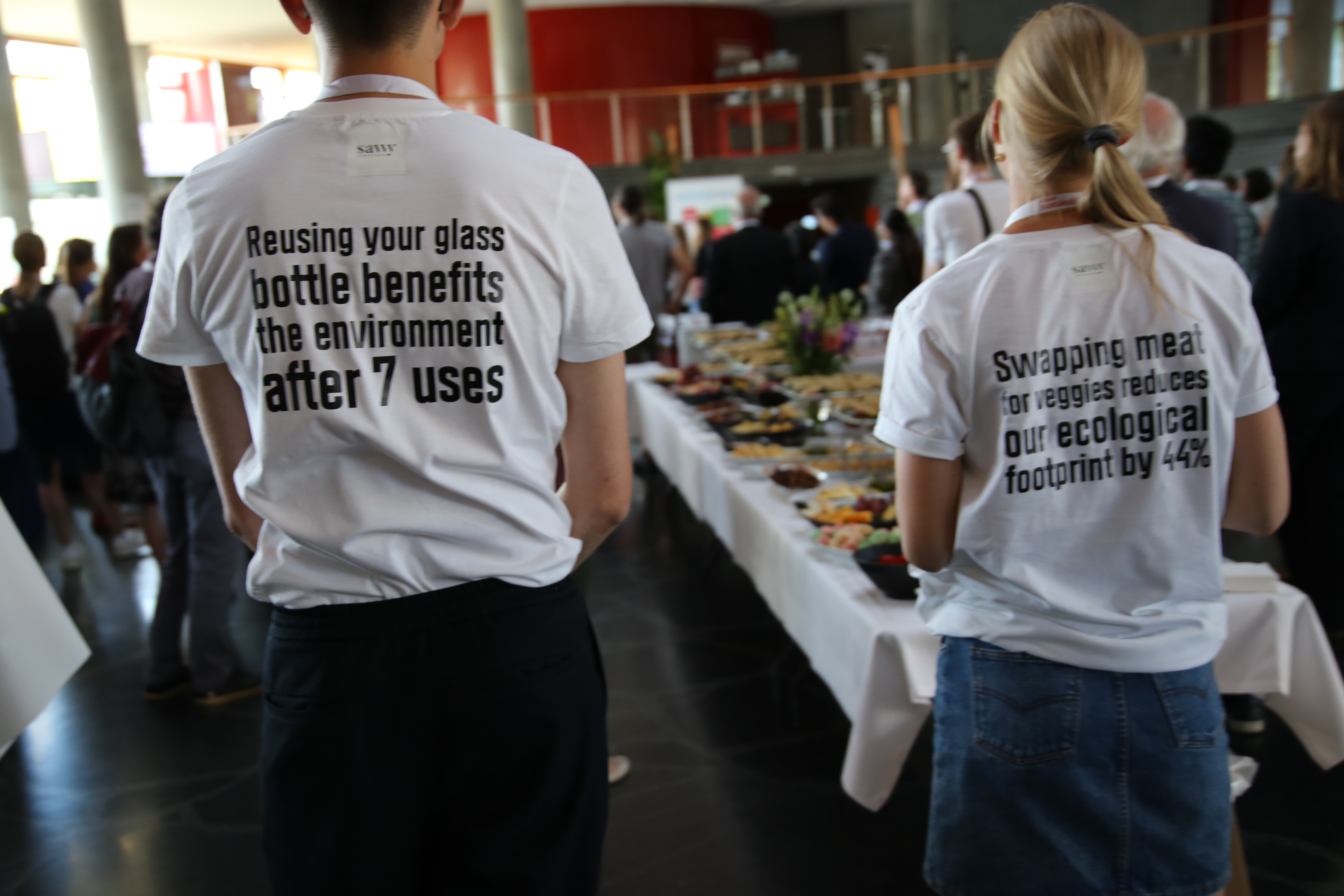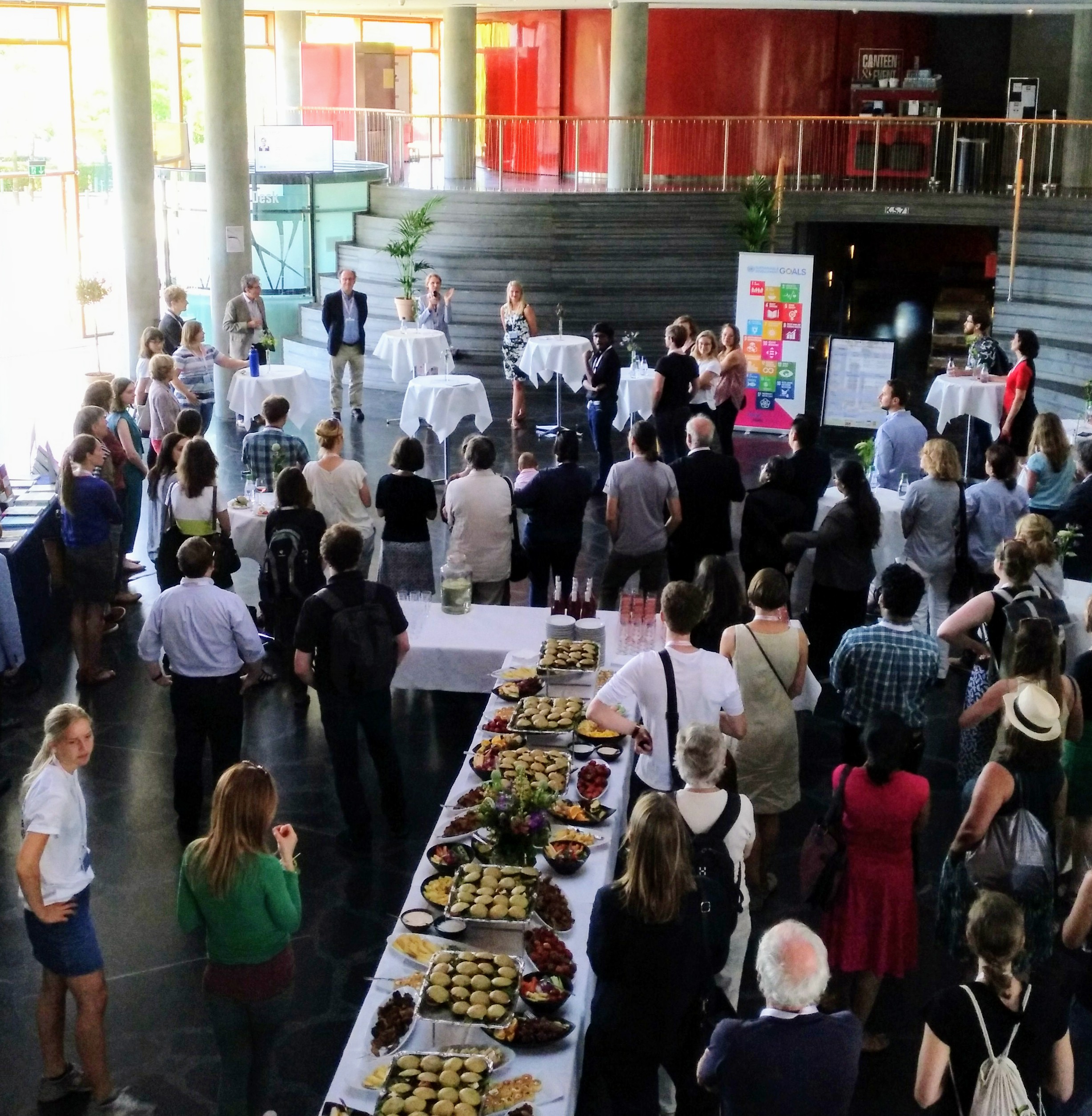By Louise Thomsen
How often do we as event coordinators ask ourselves: how can I minimize the plastic use, the waste, the paper? I could also reverse the question and ask: Could we imagine a smarter, more efficient and even more inspiring new way to host events?
Copenhagen Business School hosts a significant number of conferences and other events throughout a year and all carry the opportunity to be managed more sustainably. But, what makes an event sustainable? In June, the Sustainable Consumption Conference hosted by the VELUX Endowed Chair in Corporate Sustainability at CBS became the first pilot conference for implementing sustainable initiatives at a bigger event at CBS.
Hosting events is a wasteful affair
We all know exactly what to expect when attending a conference. You receive a name tag when you register, which you usually throw in the waste bin when you leave. You get a plastic bottle of water, and when you are done with that, or even before you are done, you get another one. You get the conference programme and the participant list which you look at a couple of times before that goes into the waste bin. Often printed in colour.
Now, imagine attending a conference with no plastic bottles, no paper, no meat, and no food waste. Imagine, how this conference would increase the level of awareness, communication and engagement between the participants and the hosts. And ignite fruitful discussions because we would realize, how much we can actually achieve with little changes in our everyday lives.
Sustainability taken to new heights
On June 27-30, more than 200 scholars and policy practitioners participated in an international conference on sustainable consumption at Copenhagen Business School, The conference topic Sustainable Consumption naturally raised the question how a sustainable conference could look like at Copenhagen Business School? No attempt at all to satisfy the conference’s title would be more than hypocritical.
In order to make sure that the sustainability initiatives implemented at the conference were the most sustainable solutions and had a high impact factor, the conference organizers allied themselves with a group of students from the Danish Technical University (DTU) who were doing a course on Life Cycle Assessments.
The students received 2 cases
- How should the conference supply water?
- How should the conference be catered?
Over the course of 4 months, the DTU student teams collected data from CBS and carried out life cycle assessments taking into account various impact factors such as production, transportation, use and disposal etc. Based on the results, all conference meals were vegetarian, and all conference participants received one glass bottle that could be filled from water dispensers throughout the entire conference.

The conference participants also received information about the sustainability initiatives that they could expect prior to the conference. The findings from the life cycle assessment were communicated on posters and on the back of the staff t-shirts. All conference staff engaged with the participants and assisted with water bottles and waste sorting. Furthermore, the conference participants were continuously encouraged to share feedback and discuss the attempts made with each other and the staff.
Implemented sustainability initiatives at the Sustainable Consumption Conference
- Each conference participant received one reusable glass bottle, which replaced single-use plastic bottles for the distribution of water throughout the conference.
- Every meal served at the conference was vegetarian, reducing the environmental impact of the conference’s catering by 44% compared to meat-based meals.
- Participants were asked to sort their waste throughout the conference, using designated bins for paper, plastic, food, and general waste.
- The conference was largely paperless. Programs and other general information were made available in ways that reduced the need for paper, such as printed posters and an app with, among other information, the timetable.
- The lanyards for name tags were made from recycled polyester, and both name tags and lanyards were collected for reuse after the conference.
- Food waste was minimized by asking participants to give notice in advance about which meals they were going to participate in, and any leftover food was brought to a nearby centre for homeless people.
- All conference staff wore a sustainable and organic cotton t-shirt with key sustainability messages on the back.
Invitation to a learning journey
When hosting an event at CBS, you are in touch with many different stakeholders who have procedures on how to efficiently meet requests on catering, waste handling, or cleaning. This means that it must be a collaborative effort if you want to change the existing structures. Engagement and communication are key.
We should not get carried away by the belief that the easiest solutions to implement will necessarily be the most impactful or more environmentally significant than our starting point. There is a big difference between solutions that carry a high degree of reducing CO2-emissions (real impact), and solutions that have the purpose of creating awareness. Both aspects are highly important. However, we should be aware of when we spend resources on one or the other and communicate this clearly.
I want to invite you to think about how we can improve our ecological footprint when we host events at CBS and elsewhere. As you will soon learn, there is no such thing as a “sustainable event”. However, there are well-founded decisions and much to learn if we dare to ask the question:
How can we raise the bar for sustainable events?
Louise Thomsen is Project Manager for CBS PRME and the VELUX Chair in Corporate Sustainability at the Department of Management, Society and Communication, CBS. Louise is focused on implementing the UN Sustainable Development Goals in an university context through student engagement. Follow her on LinkedIn and Twitter.
Save the date: 29 August, 15 h, Dalgas Have, Copenhagen Business School.
Creating a whole conference to have a significantly reduced amount of waste, use of paper and plastics is a big challenge. But many people also wonder, what they can do as individuals to limit climate change, if there is anything at all.
This issue is treated in another edition of the Sustainability Seminar Series at the department of Management, Society and Communication at CBS.
For more information and sign-up click on “What Can the Individual Do to help Limit Climate Change?”.
